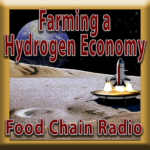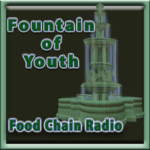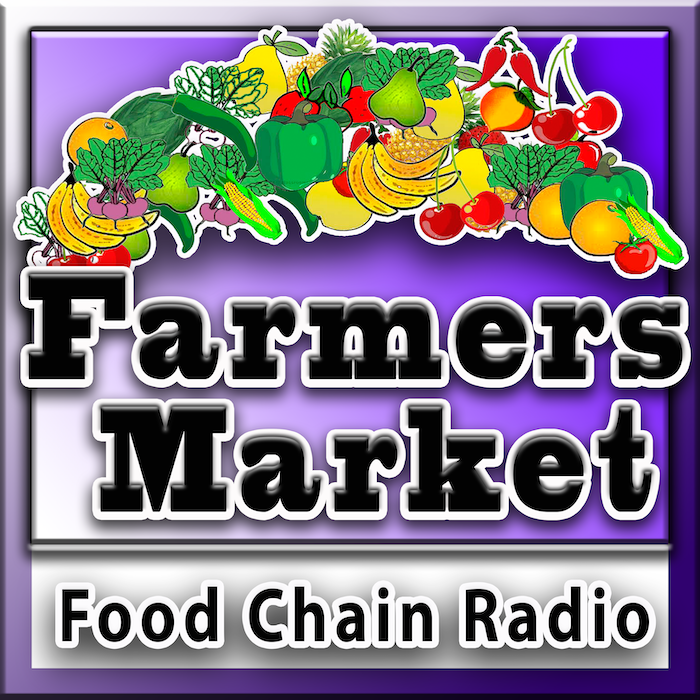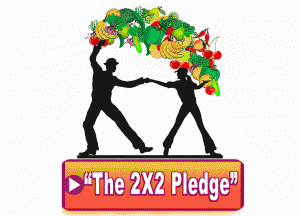
Farming Hydrogen
August 16, 2023
Fountain of Youth
January 26, 2024Farmers Market
Michael Olson’s Food Chain Radio Show #1351
Listen Now…
GUEST: Allen Moy – Executive Director Pacific Coast Farmers Market Association
We begin with Michael Olson’s Second Law of the Food Chain: The farther we go from the source of our food, the less control we have over what’s in our food.

Michael Olson Food Chain Radio – Closing the Distance to Our Food With the Farmers Market
If the average food in the United States travels 1,500 miles from where it is grown to where it is eaten, then we city people simply do not have much control over what is in our food.
Let’s consider shopping for garlic, which can easily be found for sale in most every city grocery store. However, approximately one-third of all garlic now being sold in the United States was grown by farmers over 5,000 miles away. The reason so much of the garlic we eat comes from so far away is that it costs less to grow it there, and ship it here.
We need to ask, how much do distant garlic farmers care about the people who will be eating their garlic? What if the distant farmers decide that it would cost less to dry the garlic over a coal burning fire, even though the smoke from that fire would contaminate the garlic with mercury? Coal-burning fire could save time and money resulting in a tempting production shortcut.
Do our numerous food safety certifiers and inspectors – with all of their rules and regulations – really protect the end consumers from distant farmers?
Those of us who live in the city have two choices when shopping for food. We can buy the cheap food that comes from far away, or we can find ways to close the distance and find food with its farmer’s face on it?. And so we ask:
Leave a comment below: How can city dwellers close the distance to their food?
Michael Olson’s Three Laws of the Food Chain
#1 Agriculture is the foundation upon which we build all our sand castles.
#2 The farther we go from the source of our food, the less control we have over what’s in that food.
#3 Cheap food isn’t! READ MORE



2 Comments
Is it more difficult for people in town or in cities to get food directly from a farm than it is for those in the country?
Most people in the country drive to the store. When I was a kid farmers used to allow you to glean from their field if they were done picking fruit, digging potatoes, carrots or onions, but that’s often not the case anymore due to liability. When I asked a local orchardist about gleaning apples when he was done picking, he made it perfectly clear he’d rather give me apples that have me in his orchards due to liability… and I’m a local who grew up farming.
I don’t know of a farmer who would sell an individual potatoes, apples, onions or virtually any other crop; They are not equipped for it; the selling price would be so small as to be totally insignificant. The average local field is close to 160 acres; (1/4 square mile under circle irrigation). Some large orchards and vineyards are up to 1000 acres or more. A local grape crush plant can produce 7 million gallons of wine a year. Selling 10 to 20 pounds of anything, or a couple cases of wine is irrelevant Many of our local crops, such as dry beans, green peas, lima beans, sweet corn, wheat and other cereal grains and other crops must be cleaned from field residue, small stones, dead bugs such as grasshoppers, and dust in the case of dry grain, and processed before they can be eaten. There are certainly many opportunities for wine tasting, and a few small scale farm to market operations, but I suspect they produce less than 100th of 1 percent of any crop produced.
I wholeheartedly support the idea that we should work toward consuming local food to the greatest extent possible, but I also believe public needs to be re-educated about food and all of the associated costs. In all honesty, there’s nothing wrong with an ear of corn has the last two inches destroyed by corn worm. The easy thing to do is snap off the last two or three inches and keep the rest of it but today’s consumer won’t buy it if it’s not perfect, meaning that more pesticides are required. The same can be said for a misshapen apple or other fruit. Nutritional value has not been depleted but is in fact in some cases it has been enhanced by additional phytonutrients as the plant “fought off” the predator that attacked.
Just some random opinions, please keep us thinking.
Oct 16, 2023, Your connecting food to China’s political strategies tonight was intriguing. Well in a since also scarry! Your reasoning sounded buttoned-down. I am a big believer in the fact culture, as defined in anthropological readings is the actual framework behind all human behaviors. That is to say NOT the many dogmas in religions’ are intimidations’ of autocratic dictators. But the lack of mans freedom to think over issue he wants to exercise. Rather behavior molded by say socialism / communism. Bad. Yet suffer the messiness of a democracy. Better stop here , Craig Montague.